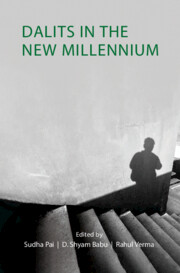Book contents
- Frontmatter
- Contents
- List of Figures
- List of Tables
- Acknowledgements
- 1 Introduction: Dalit Discourse in the New Millennium
- Part I Shifting Patterns of Electoral Politics
- Part II Popular Culture, Discourse, and Protest
- Part III Transformations in Ideology and Identity
- Part IV Aspirations and Anxieties
- 16 Technology in the Lives of Young Dalits
- 17 Dalit Middle Class: Aspirations, Networks, and Social Capital
- 18 The Persisting Developmental Gap: A Case for Restitution and Reparations
- 19 Dalit Capitalism: Adversity, Opportunity, and Agency
- Part V Discrimination and Representation
- About the Contributors
- Index
19 - Dalit Capitalism: Adversity, Opportunity, and Agency
from Part IV - Aspirations and Anxieties
Published online by Cambridge University Press: 12 July 2023
- Frontmatter
- Contents
- List of Figures
- List of Tables
- Acknowledgements
- 1 Introduction: Dalit Discourse in the New Millennium
- Part I Shifting Patterns of Electoral Politics
- Part II Popular Culture, Discourse, and Protest
- Part III Transformations in Ideology and Identity
- Part IV Aspirations and Anxieties
- 16 Technology in the Lives of Young Dalits
- 17 Dalit Middle Class: Aspirations, Networks, and Social Capital
- 18 The Persisting Developmental Gap: A Case for Restitution and Reparations
- 19 Dalit Capitalism: Adversity, Opportunity, and Agency
- Part V Discrimination and Representation
- About the Contributors
- Index
Summary
The empowerment of Dalits has been linear. There was a time when an ‘educated Dalit’ was more of a mythical beast than reality; the same was the case with a Dalit doctor, a Dalit officer, a Dalit minister, or a Dalit governor. It has been a progression of sorts in the sense that without education Dalits could not have entered the civil services, and without their electoral participation – through a quota system for Dalit candidates under universal adult franchise1 – even a few of them would not have ended up as ministers, governors, and so on.
The story of their upward mobility, a journey that has yet to reach its destination, began in the mid-nineteenth century which witnessed two radical developments in the history of India. First, schools were thrown open to Dalit children from 1853 onwards. Though this proved to be a symbolic act on paper, unacceptable to broader society, its transformative potential came to be realized in subsequent decades. The second development was even more radical, and its impact proved to be long-lasting. In 1862, the Indian Penal Code (IPC) came into force, decreeing at the stroke of a pen that all Indians were equal before the law, irrespective of their caste, creed, or gender. That a crime attracts the same punishment for all was an alien idea, but it forever changed the fate of lower castes for the better. The introduction of the Code of Criminal Procedure (CrPC) two decades later laid a firm foundation for a rule-based society.
The two aforementioned developments triggered numerous popular movements and policy initiatives, a list of which is too long to enumerate here. The process culminated in the Constitution of India which embodies the universal values of liberty, equality, and fraternity, and contains an entire section (Part XVI) on the upliftment of Dalits and other weaker sections through welfare measures such as job quotas. Job quotas by nature tend to benefit only a tiny section of any group, and only a fraction of Dalits entered public employment, thus forming the nucleus of a Dalit bourgeoisie.
- Type
- Chapter
- Information
- Dalits in the New Millennium , pp. 340 - 354Publisher: Cambridge University PressPrint publication year: 2023



